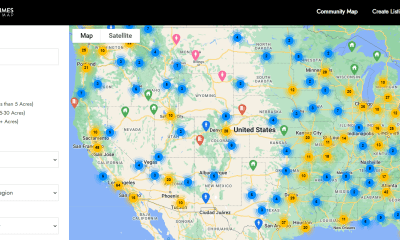Lifestyle
Leadership, From J to E
How many of these traits do you have? One? None? All 14? I am a firm believer that anyone, given the will and opportunity, can develop into a leader.

By: Woodworking Gunny Bear
There are many things from my 20 years in the Marine Corps that I do not remember fondly. That being said, the opportunity and honor to lead thousands of young men, both on and off the battlefield, is a memory that can never be tarnished. As a Marine, being a capable leader is as important of a skill as firing a weapon accurately. Because of this, the Marine Corps begins developing its future leaders in boot camp. The process of learning to effectively lead others continues throughout a Marine’s career. To aid in this endeavor, the Corps has created countless leadership courses as well as a world-class Academy system. While attending the various Academies, Marines attempt to gain mastery in a multitude of subjects such as military history, tactics, strategy, and of course, leadership.
Contrary to popular belief, Marine boot camp isn’t all shooting, marching, and bayonet training, although there is a fair amount of each.
There are hundreds of hours of classes. Everything you do in boot camp has a class (or a multitude of classes) associated with it, even shooting, marching, and bayonet training. Along with each class, there is often a new acronym to learn. The military is thoroughly convinced that it is impossible for troops to remember anything that doesn’t have an acronym. The primary acronym linked to leadership is…wait for it…JJ DID TIE BUCKLE. I’m sure someone received a medal for that one. As ridiculous as it sounds, any Marine worth their salt will know that JJ DID TIE BUCKLE is the acronym for remembering the 14 Marine Corps leadership traits. These traits, however, aren’t only applicable to Marines. Anyone wanting to step up into a leadership position or to further develop their existing skill as a leader will find it difficult to do so without first making a conscious decision to begin exhibiting the following traits:
Justice – A good leader remains fair and consistent. Few will follow someone who always hands the easiest task to their best friend or doles out overly harsh punishments that do not fit the crime. They willingly follow someone who ensures that their decisions, regardless of the people or circumstances involved, are just.
Judgment – There are few quicker ways to get someone to stop looking to you for leadership than consistently making poor decisions. Leaders must not only make decisions, and they must make sound ones. Even if a specific decision results in failure, ensure you’re able to defend each decision you make with sound reasoning and logic.
Dependability – Leaders who cannot be relied upon to perform their jobs properly lose respect quickly. It’s even worse when a leader isn’t even around when it really counts. Develop a reputation for dependability by performing each task to the best of your ability, being on time, never making excuses, and taking responsibility for failures.
Initiative – Good leaders don’t wait for someone to tell them what to do. They see a problem as an opportunity and make sure it’s addressed right away. Develop your initiative by actively looking for problems or tasks and working on them without having to be told to do so. Don’t forget the second J. Many Marines have been told the following, “Good initiative, bad judgment.” If the task is new or complex, it is a good idea to do some research or seek a bit of guidance.
Decisiveness – Decisiveness means making decisions quickly and confidently. Decisive leaders aren’t so worried about making a mistake that they freeze at decision time, but they’re not so brash that they miss important facts (see: judgment). You can develop your decisiveness by quickly weighing the pros and cons of even trivial decisions, then sticking with your choice. When larger, more important decisions present themselves, you’ll feel more confident while quickly working through the decision-making process.
Tact – Tact is similar to the saying, “You catch more flies with honey than vinegar.” You don’t have to be overly nice, but a tactful leader remains polite and calm even in stressful situations. Taking a moment to consider tact BEFORE an interaction will help you behave courteously even when you feel like clicking off safe. If you tend to struggle with tact, remember that the negative results of a leader’s lack of tact is more often felt by those being led.
Integrity – Having integrity means valuing moral principles above all else and refusing to compromise on values, even when everyone else is doing so. A leader without integrity isn’t worth following, so always strive to make moral choices, especially when no one is watching.
Enthusiasm – Enthusiastic leaders inspire others by showing sincere excitement about any task they’re given. Even the most menial job will be taken on with zeal by others if you can remain enthusiastic and show genuine interest in its accomplishment.
Bearing – If you strive to be a leader who others respect, you need to carry yourself with confidence, competence, and control. I have known several men in leadership roles who lost all of their troop’s respect because, when the proverbial poop hit the fan, they became manic and outwardly showed their fear. Always be aware that those being led are watching you for cues and will gain or lose confidence based on how you appear to be handling a situation.
Unselfishness – We are all familiar with the concept of planting a tree, from which you may never get to enjoy the shade or fruit. A good leader never has ulterior or selfish motives, and they always put the success of their team first. Any accomplished business owner will tell you that the employees always get paid first, take the most breaks, and get the most days off. I have completely written off “leaders” for the simple act of eating before their troops. It told me everything I needed to know about them. It is also important to give credit to subordinates whenever possible.
Courage – Most people think of courage as not being afraid of something. In actuality, if someone has never been afraid, they have never had an opportunity to be courageous. Courage is grace and the ability to perform in the face of fear. A great leader needs both physical courage when leading a team into a dangerous situation; and moral courage to stand up for his or her beliefs, especially when making an unpopular decision. Develop courage by identifying and facing down your fears.
Knowledge – Knowledgeable leaders work diligently to learn everything required to perform their job at the highest level. They constantly strive to learn more about their tasks, their subordinates, and their general field of expertise. A knowledgeable leader is someone that others seek out in order to get the right answer. There is a serious pitfall to becoming the subject matter expert, however. Some leaders become afraid to say that they don’t know something. Many good leaders have shot themselves in the foot by making up an answer on the spot. Your subordinates will rarely look down on you for saying, “I’m not sure about that, but let me find out for you.” Just don’t forget to follow up with them once you find your answer!
Loyalty – The Marine Corps motto is Semper Fidelis (Always Faithful). Loyalty to Country, Corps, and your fellow Marines are reinforced heavily throughout Marine Corps training. Some ways of showing loyalty as a leader are: 1) Never discuss team problems with outsiders. 2) Never complain about an order from your own boss in front of your subordinates.
3) Always ask your subordinates for their side of the story before addressing a problem. That doesn’t mean that you have to decide in their favor, but everyone will see that you care enough about them to ask. 4) Ensure that you are always loyal, or you will never gain loyalty in return. As much as possible, treat your team as your family.
Endurance – I always found it fitting that the final leadership trait was endurance. While each leadership trait interplays with one or more other traits, endurance must be applied to them all. The ability to continuously strive to finish a task, regardless of difficulty, pain, or fatigue, is what defines a leader with endurance. A true leader never slacks off when it comes to exhibiting these traits, especially when it would be easy to “let one slide.” You can’t just dip your toes into developing yourself as a leader. You have to dive in and never stop swimming. The only way to improve endurance in your personal life is by pushing yourself past your perceived limits on a regular basis.

Well, there it is. Leadership from J to E. There are other aspects of leadership that I learned in the Marine Corps, all of which tend to refer back to the basic leadership traits of JJ DID TIE BUCKLE. I may eventually write more about what I learned about leadership.
The 11 Marine Corps Leadership Principles are definitely worth covering, but without embodying the traits listed above, you would be better off following or just getting out of the way.
How many of these traits do you have? One? None? All 14? I am a firm believer that anyone, given the will and opportunity, can develop into a leader. I have personally witnessed many a “natural leader” crumble under the weight of command. Conversely, I have watched the weakest, meekest Marines push themselves to excellence and assume the mantle of leadership. A great leader strives for continual growth. Spend some time each day working on at least one of these traits, and (with endurance) you’ll eventually grow into a leader others will not only follow but respect.

Social media shows doomsayers, pessimists, and even truther-prepper types blasting out warnings of impending doom and gloom. You may feel the urge to fight if you can bear this without your emotions causing you to flee or freeze.
But what does fighting for your future mean? Unfortunately, much internet commentary directs your focus to what others are doing and how they affect you, calling for action to demand change. While this may have its place, it neglects the freedom we already possess and can inadvertently bypass our authority and control.
Here are a few simple things to think about that can help you fight against the future you don’t want, by building the future you do want.
Financial Future
Securing your financial stability is the cornerstone of building a successful future. This starts with becoming debt-free. Debt is a shackle that limits your freedom and ties you to a system you might not align with. Aim to clear your debts quickly and avoid taking on new ones.
Next, focus on land ownership. Owning land provides a place to call home and offers opportunities for self-sufficiency, such as gardening, raising livestock, or even setting up a small business. This autonomy can buffer against economic uncertainties and offer a sense of security.
Continually work towards a sustainable income. Whether through traditional employment, investments, freelancing, or entrepreneurial ventures, ensure your income sources are diversified and resilient to economic shifts. Build skills that are in demand and can be adapted to various roles. Financial independence is crucial in crafting a future you control rather than one external force dictates.
Education
Education is the foundation of personal and professional growth. Embrace self-study and continuous learning. The more skills and knowledge you acquire, the more adaptable you become in a rapidly changing world. Invest in personal improvement by setting aside time for reading, courses, and practical skill-building.
Homeschooling is another powerful tool. It allows you to tailor education to your family’s needs and values, ensuring your children learn what truly matters. Foster a love of learning in your household, emphasizing critical thinking, creativity, and practical skills over rote memorization.
Family Protection
Protecting your family goes beyond physical safety; it involves being a guiding force and a source of stability. We must also protect our families from negative and misguided influences. Be a leader to your children by setting a positive example. Teach them resilience, self-reliance, and the importance of moral values. Strengthen bonds with your siblings through support and cooperation, creating a solid familial network.
Honoring your seniors is equally essential. They possess invaluable wisdom and experience. Encourage intergenerational communication and respect, ensuring your family’s heritage and lessons are passed down.
Mindset
Your mindset is the driving force behind every action. Take ownership of your life and decisions, understanding that responsibility and accountability are keys to freedom. Respect your time and finances, recognizing them as finite resources that require careful management.
Develop a mindset of resilience and adaptability. Life is unpredictable, and being mentally prepared for challenges ensures you can face them head-on. Cultivate a positive outlook, focusing on solutions rather than problems. This proactive attitude will guide you in building the life you want.
Community Building
No one succeeds alone. Connect with people who share your values and vision. Building a community of like-minded individuals offers support, shared resources, and collective wisdom. Engage in activities and friendships that bring joy and complement your life.
We would like to take it a step further by saying, we don’t build the future we want as a reaction to the future we don’t want. We build, because we love, its fun and fulfilling. Our fight is to thrive, not to survive. Survival is a consequence of thriving. So aim high! Take control of your life, embrace self-responsibility, and connect with others on the same path.
Those looking to connect with a broader network should consider joining our Community app. It’s a platform dedicated to bringing together individuals who strive for independence. Whether you’re looking for advice, collaboration, or simply companionship on your journey, our thriving community is a valuable resource.
The power to shape your future is in your hands.
Lifestyle
Making Pine Needle Soda: A Fantastic Foraged Beverage
Pine needle soda, a truly one-of-a-kind beverage, has been savored worldwide for its zesty taste and health benefits.

Pine needle soda, a truly one-of-a-kind beverage, has been savored worldwide for its zesty taste and health benefits. It’s not just a refreshing drink, but also a creative use of natural ingredients. Here’s a simple guide to crafting this unique soda at home.
Pine needles are rich in antioxidants and vitamin C, which help boost the immune system. Different species of needles can offer different flavors, but it’s important to make sure the trees you harvest from are not toxic. Avoid using needles from yew, Norfolk Island pine, or Ponderosa pine. You should do additional research to insure you are staying safe.
The recipe I followed is easy and only requires a jar, strainer, and measuring cups. Start by identifying the pine tree you would like to harvest from; I used fir, tamarack, and white pine. Again, make sure you don’t use anything unsafe. You can choose to use new sprouted tips or even mature needles, which means you can also have fresh pine soda in the winter months!
You can scale up the recipe, but for reference, use the following:
- 2 Cups Pine needles
- 2 Cups Water
- 2-4 Tablespoons sugar (depending on sweetness you desire)
For the above measurements, I recommend using a quart jar. Begin by rinsing the needles, not too thoroughly, because the carbonation comes from natural yeast living on the pine needles. Add the sugar and water and seal the jar. Leave to ferment so it can become bubbly soda! Make sure to “burp” the jar every couple of days to release some of the gas so it does not build up and explode the jar! In 5-7 days, you will have soda, God willing.
Serve over ice and with some citrus if you’d like. Enjoy!
Lifestyle
Reconnect and Rejoice: Beartaria Times Weekly Challenge
Maintaining solid relationships with family and friends offers numerous benefits that enrich our lives in meaningful ways…

In our fast-paced world, losing touch with friends and family members who once played significant roles in our lives is easy. This week, the Beartaria Times invites you to participate in our heartwarming challenge: Reconnect with someone you haven’t spoken to in a while. Give them a call, ask how they’ve been, and rekindle that bond.
Maintaining solid relationships with family and friends offers numerous benefits that enrich our lives in meaningful ways:
1. Emotional Support: Close relationships provide a robust support system during tough times, offering comfort, advice, and a sense of belonging.
2. Improved Mental Health: Regular interactions with loved ones reduces feelings of loneliness and depression, contributing to mental well-being.
3. Increased Longevity: Studies have shown that strong social connections tend to help people live longer and enjoy better health.
4. Enhanced Happiness: Sharing moments, memories, and experiences with others brings joy and fulfillment, fostering a more positive outlook on life.
5. Personal Growth: Friends and family often challenge us to grow, learn, and become better versions of ourselves.
6. Creating Memories: Every interaction creates new memories, adding richness to our personal histories and offering stories to cherish for years to come.
We encourage you to take this challenge to heart and reach out to someone you miss. Whether it’s a friend from high school, a distant relative, or a former colleague, a simple phone call can reignite connections and brighten your day and theirs.
Once you’ve reconnected, share your stories and experiences on the Beartaria Times community app. Post about who you called, the memories you shared, and how the conversation went. Did you learn something new? Did you laugh about old times? These stories can inspire others to take similar steps in their lives.
Join us in this week’s challenge and celebrate the beauty of human connection. Let’s make an effort to nurture our relationships and remind those we care about that they are valued and remembered.
Happy connecting, Beartarians! We look forward to hearing your heartwarming stories.
Sincerly,
– The Beartaria Times Team
-

 Just Crushing2 weeks ago
Just Crushing2 weeks agoChristopher Gardner Completes First Dome Framing Project in Missouri: Exclusive Interview
-

 Just Crushing2 months ago
Just Crushing2 months agoBeartaria Ozark Campground Launches Community Forum!
-

 Just Crushing2 months ago
Just Crushing2 months agoMap it! – Discover Beartarians Living, Working, and Crushing Near You!
-

 Just Crushing2 months ago
Just Crushing2 months agoWhy Do We Feel So Free?
-

 Lifestyle2 months ago
Lifestyle2 months agoReconnect and Rejoice: Beartaria Times Weekly Challenge
-

 Reports2 months ago
Reports2 months agoReport: EF-1 Tornado Touches Down In The Ozarks
-

 Business2 months ago
Business2 months ago3000 Members In Our Business Group!: This Week On Our Community App!
-

 Wellness2 months ago
Wellness2 months agoBeartaria Times Member Shares History and Benefits of Haymaker’s Punch





































